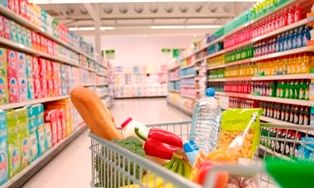
Shops starting to limit some products as ‘price storm’ hits South Africa
South Africans have noticed the price of many goods increasing over the last month, and can expect to see fewer products associated with sunflower oil on retailer shelves as the ongoing crisis in Ukraine bites, says professional services firm PwC.
These constraints have hit in response to higher internal commodity prices and supply scarcity as exports from Ukraine dropped, it said.
“An estimated 27 million tonnes of grain (e.g. sunflowers and soya) is stuck in the country, with up to four million tonnes sitting in terminals and on ships stranded in ports.
“With the ports of Mariupol, Berdiansk, and Kherson under Russian control, harbour infrastructure at Mykolaiv severely damaged, and three ports in the greater Odessa area either blocked or with mined waterways, exports have declined significantly,” it said.
Statistics South Africa reported that the cost of fats and oils increased by 9.5% month-on-month in March due to this supply constraint. Globally, sunflower prices are now 45% higher compared to a year ago.
“South Africa’s imported food products cost 5.0% m-o-m more due in part to the increase in food oil prices: sunflower oil is used in the manufacturing of diverse products, including margarine, ice cream, chocolate, canned goods and breakfast cereals, amongst many others. The food oil product is also used in the production of medicine and other health products.”
Many grain products produced locally, like sunflowers, follow international price trends, PwC said.
“As a result, even the prices of locally produced soft commodities have increased significantly since February. Unsurprisingly, some retailers are limiting the number of products in the cooking oil category that shoppers can buy.
“According to a survey by the Pietermaritzburg Economic Justice & Dignity (PMBEJD) group, the cost of buying a five-litre bottle of cooking oil in Johannesburg increased by 20% from February to April, and jumped by 30% in Durban over the same period.”
 https://businesstech.co.za/news/wp-content/uploads/2022/05/PwC-prices-300x203.png 300w" alt="" width="565" height="382" class="size-full wp-image-591614 aligncenter lazyloaded" style="height: auto; max-width: 100%; transition: opacity 0.3s ease 0s; clear: both; opacity: 1; margin: 0px auto; display: block; backface-visibility: hidden;" data-aspectratio="565/382" data-src="https://businesstech.co.za/news/wp-content/uploads/2022/05/PwC-prices.png" data-srcset="https://businesstech.co.za/news/wp-content/uploads/2022/05/PwC-prices.png 565w, https://businesstech.co.za/news/wp-content/uploads/2022/05/PwC-prices-300x203.png 300w" data-mce-src="https://businesstech.co.za/news/wp-content/uploads/2022/05/PwC-prices.png" data-mce-style="height: auto; max-width: 100%; transition: opacity 0.3s ease 0s; clear: both; opacity: 1; margin: 0px auto; display: block; backface-visibility: hidden;" />
https://businesstech.co.za/news/wp-content/uploads/2022/05/PwC-prices-300x203.png 300w" alt="" width="565" height="382" class="size-full wp-image-591614 aligncenter lazyloaded" style="height: auto; max-width: 100%; transition: opacity 0.3s ease 0s; clear: both; opacity: 1; margin: 0px auto; display: block; backface-visibility: hidden;" data-aspectratio="565/382" data-src="https://businesstech.co.za/news/wp-content/uploads/2022/05/PwC-prices.png" data-srcset="https://businesstech.co.za/news/wp-content/uploads/2022/05/PwC-prices.png 565w, https://businesstech.co.za/news/wp-content/uploads/2022/05/PwC-prices-300x203.png 300w" data-mce-src="https://businesstech.co.za/news/wp-content/uploads/2022/05/PwC-prices.png" data-mce-style="height: auto; max-width: 100%; transition: opacity 0.3s ease 0s; clear: both; opacity: 1; margin: 0px auto; display: block; backface-visibility: hidden;" />
Energy prices
The other major import price shock has been the jump in energy prices. Crude petroleum cost 9% monthly and 65.1% annually more to import in March due to higher international commodity prices.
“Motorists would have felt this at the pumps. Despite some welcome tax relief implemented by the government, the Gauteng price for 95 octane unleaded petrol increased from R19.61/litre in January to R21.84/litre at the start of May,” PwC said.
“South Africans were set to see a further R4/litre increase in the petrol price at the start of June due to as weaker rand, higher oil prices, and the end of the two-month tax relief of R1.50/litre.
“Officials from the National Treasury and the Department of Minerals and Energy met on May 29 to discuss various options for extending the relief, though at the time of writing, no decision had yet been announced.”
News Category
- International retailers
- On the move
- Awards and achievements
- Legislation
- Wine and liquor
- Africa
- Going green
- Supplier news
- Research tools
- Retailer trading results
- Supply chain
- Innovation and technology
- Economic factors
- Crime and security
- Store Openings
- Marketing and Promotions
- Social Responsibility
- Brand Press Office
Related Articles

Empowering South African households through gro...

SPAR shares practical tips to beat food inflation

South African motorists could be paying up to R...

Big VAT changes on the cards


